Seagate Barracuda 7200.8: 400GBs with NCQ
by Purav Sanghani on April 20, 2005 4:30 PM EST- Posted in
- Storage
Real World Tests - File System Tasks
Synthetic benchmarks are not always the best gauge in measuring the "real" performance of hardware, which is why we have incorporated a few real world tests in our storage reviews. One of our tests, the file system performance test, measures the drive's ability to handle file zip, unzip, and copy operations. This is a great measure of how one drive compares to another and we have put together a group of tasks that most of us typically use.- File Zip Test - We take a 300MB file and measure the time that it takes for our test bed to compress it to ZIP format on our test drive. We then run the test again with 300 1MB files to see how the drive performs when working with multiple files.
- File Unzip Test - Using the same methodology as the File Zip Test, we take a ZIP file of a single 300MB file as well as a ZIP file of 300 1MB files and measure the time that it takes to uncompress each ZIP successfully.
- File Copy Test - We measure how long it takes for the system with our test drive to copy a single 300MB file as well as 300 1MB files to a separate folder on the hard drive.
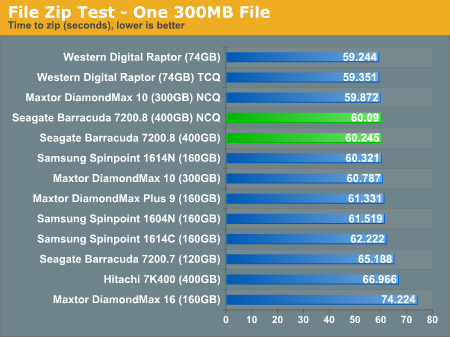
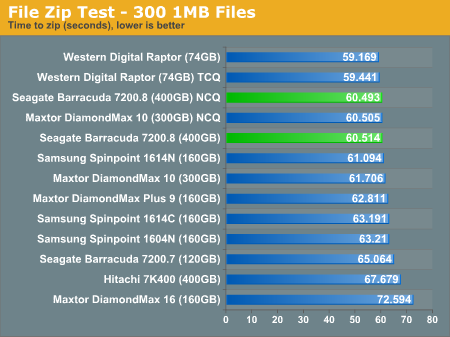

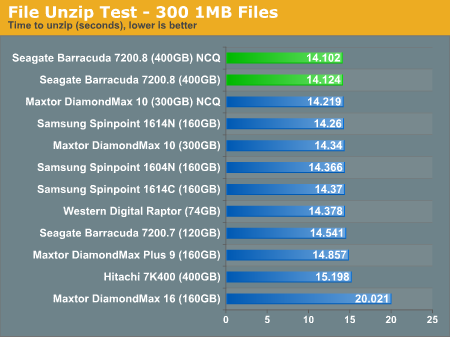
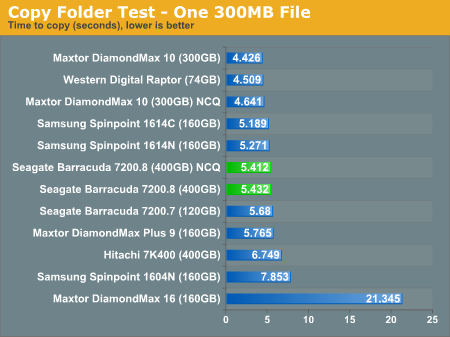
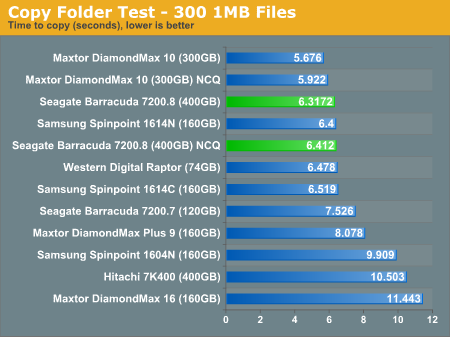










44 Comments
View All Comments
PuravSanghani - Wednesday, April 20, 2005 - link
mjz5: With our nForce4 platform there is an option under the drive controllers options tab called "Enable command queuing". By checking this option and restarting the system, command queuing will be enabled. Some boards, however, enable NCQ/TCQ by default through the BIOS. You may want to check with your motherboard manual on that.Take care,
Purav
mjz5 - Wednesday, April 20, 2005 - link
Nighteye2 has a good question. How does NCQ work with RAID arrays? Is it better, worse???How would I know if TCQ is enabled on my 74 raptor?
xsilver - Wednesday, April 20, 2005 - link
#21 LOL --- you wouldnt want that space anyways even if it was there.... its cant be guaranteed reliable so would you trust 100gb's of your drive that could die at any moment???quorm - Wednesday, April 20, 2005 - link
I have one of the 300gb 7200.8 drives. It's mentioned in the article that all of the 7200.8 drives use a 3x133gb platter configuration. I was wondering if there is any hack to allow access to the remaining 100gb of disk space. Anyone?AtaStrumf - Wednesday, April 20, 2005 - link
Hey, where did all the WD drives (apart from Raptor obviously) go??? I can get a 200 GB PATA model pretty cheap, so I'm seriously considering it. Any advice anyone?n7 - Wednesday, April 20, 2005 - link
Thanx for the review guys :)flatblastard: I'd agree.
The Raptors may not win all the benches, but i find they feel so much snappier than my other 7200RPM drives.
I certainly wouldn't mind adding a 400 Gb Seagate to my collection though :)
bob661 - Wednesday, April 20, 2005 - link
Can you guys post a UT2004 for load time graph please.flatblastard - Wednesday, April 20, 2005 - link
I'm using the raptor for my OS, and the 250GB seagate 7200.8 for everything else. I really can't tell which one is faster at loading games...but the raptor is MUCH quicker loading anything else.Icehawk - Wednesday, April 20, 2005 - link
Where were the heavier real-world multi-tasking tests like in the Intel DC previews? In those articles it appeared that NCQ offered some performance boost in heavy I/O situations - here it seems to offer zero benefit.Houdani - Wednesday, April 20, 2005 - link
I dunno. Neither the Seagate nor the Maxtor NCQ drive really impressed me. They didn't stand out from the peleton. For most performance needs, I'd have to give the yellow jersey to the Raptor, although the idle heat is a noteworthy ding.For extra capacity one of the larger models would be prudent, but for a primary drive the Raptor is fairly impressive.